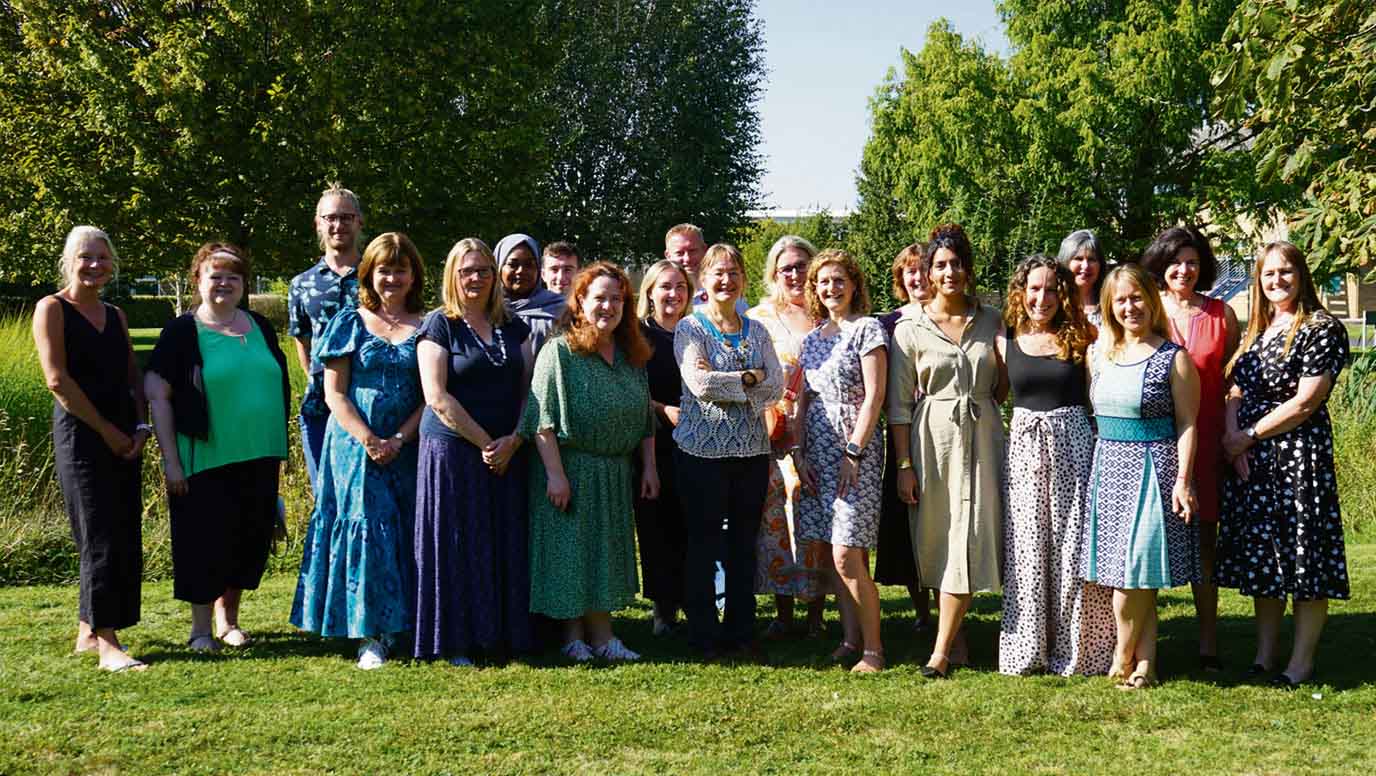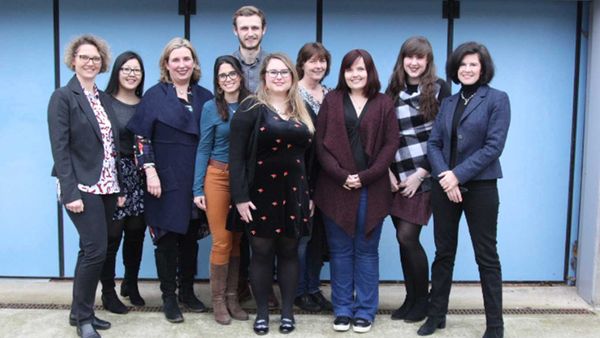Form the Future levelling the playing field in UK’s ‘most unequal city’

The organisation helps young people make decisions about their future – often a daunting prospect. It works to support schools to deliver impactful careers education so students can learn from and alongside employers.
And employers can gain access to thousands of students in Cambridge and beyond by working with Form the Future. Almost inevitably, the students concerned inject fresh ideas into the partner business in a meeting of minds.
The backdrop to why such an organisation as Form the Future is required is well documented. The top six per cent of earners who live in Cambridge take home 19 per cent of the total income generated while the bottom 20 per cent of the population account for just two per cent of that total.
Form the Future set out in June 2015 to level up that hideously uneven playing field by creating more opportunity for young people who all too often found themselves at the base of the careers pyramid gazing up in awe and envy.
How Form the Future’s influence has grown will be there for all to see when it displays the full range of its services with the help of young people and businesses at the second Cambridge Tech Week – of which more later.
Anne Bailey, who co-founded Form the Future, says the team continues to create fresh opportunities to expand the reach and influence of its various initiatives. And she pays handsome tribute to the role Allia Future Business Centre in Cambridge has played in the growth of the enterprise.
Form the Future actually started life in the Incubator on the top floor of Allia FBC’s King’s Hedges Road campus. Anne recalls: “We were just two founders and were soon joined by two employees. We were offered a year’s free rent in the Incubator as part of the startup programme we were on – originally Social Incubator East, now called Cambridge Social Ventures – and a discount on the rent in the year after that.
“That was a great incentive but I also just loved the space. Being full of people trying to change the world for the better – I always say it’s a building with good Karma.
“I can track our growth through our moves around the building. After those first four desks we decided we were making too much noise and needed our own office.
“This was on the ground floor opposite the café. We added two more colleagues when we moved. Then we needed more space and moved to the first floor and an office with eight desks.
“That served us until we needed 12 desks, at which time we moved to a lovely space on the second floor. Our next move took us to Allia’s Norfolk Street location in Cambridge city where we had even more desk space and first one, and then a second, separate meeting rooms.
“During the COVID pandemic and home working the office was largely neglected. We let go of the Norfolk Street office but we had one or two employees who needed a place to work so we moved back to the King’s Hedges Road building.
“First, we started with hotdesking. Then we took an office with four desks. Now we’ve got one with five desks and a big table. Who knows what’s next?
“It’s an incredibly flexible resource and we’ve been able to continually adjust our office requirements. And the terms are so good that even with an unpredictable income like ours we never worry that we’re overcommitting ourselves.”
In addition to great flexibility, other benefits of being based at Allia FBC’s mother ship majorly include the community at the campus, Anne adds.
“In pre-Covid days when everyone spent more time at the centre, every lunch time in the shared space was an opportunity to get to know a fellow tenant.
“Quite a few of them have been recruited over the years to deliver careers talks at schools, act as mentors, host students on work experience or recruit an apprentice. Hopefully we’ve also helped them in some way.
“We have also been able to take part in programmes led by Allia and we’re always extending our network through the introductions they make.”

Anne started Form the Future with partner, Michaela Eschbach, to tackle an insidious problem. “Young people were having to make choices about what and where to study without enough information, support or experience to make an informed decision,” she explains.
“The Connexions service had ended in 2012, schools had the obligation to provide careers education but very limited resources, and employers were complaining loudly that young people weren’t work ready.
“The pace of change in the workplace was fast outstripping changes in education and there was a growing disconnect between what students were learning at school and the skills that employers were calling for.
“Our mission was to bridge the two worlds – education and employers – and improve the way students learned about and prepared for life after school. We set out to transform careers guidance.
“Since that time we’ve worked with every student going through state schools in Greater Cambridge, as well as many in the independent sector and in schools across the Eastern region.
“We’ve worked with thousands of employers who’ve offered work experience, hundreds who deliver careers talks, and dozens who work with us to deliver really transformational experiences for young people.”
Identifying stand-out examples of satisfaction from such a pantheon is not easy but Anne identifies some of the work she is proudest of. That would include winning the original Greater Cambridge Partnership contract to deliver a Skills and Apprenticeships Service – and retaining the contract through multiple re-tenderings. “By next April when our current contract ends we’ll have been providing that service for 10 years,” Anne says.
She also highlights working with Marshall of Cambridge to take its Marshall LaunchPad programme out to the wider business community and turn it into Cambridge LaunchPad.
This programme gives STEM companies a platform for engaging and inspiring the next generation, bringing them into the workplace and giving them hands-on experiences, applying what they’re learning to the ‘real world’, and helping them to see a future for themselves working in a STEM job or a STEM company.
“For children and young people growing up in the Cambridge city region, this is so important because our economy is really dominated by science, engineering and technology,” Anne adds.
She is also proud of “moving the dial on employers’ attitudes towards investing in the next generation.” She says: “I remember one saying to me, ‘we can sit back and complain or we can get involved.’ We make it easy for companies to get involved and the difference we’ve made with their support is incredible.
“But mostly it is really gratifying when I meet students who tell me the support we provided has made a difference. One of the employers providing mock interviews at a school recently told us that he’d a mock interview, facilitated by Form the Future, just a few years back.
“He’d used what he learned to get the job he had and now he’s giving back. That’s the way it should work!”
The organisations is aware that there can be no resting on laurels. Anne says: “We continue to deliver the GCP Skills & Apprenticeships service, which is not only ensuring that every state school student gets employer encounters throughout their time at school but also helps disadvantaged students to get work experience and professional careers guidance, as well as offering support for employers to learn about apprenticeships.
“We’re going into year three of running Cambridge Unlocked, a programme we deliver with Cambridge Enterprise, which gives sixth-form students who lack connections the chance to get paid summer internships at startups and professional services firms.
“When we think about Cambridge’s label as the most unequal city, programmes like this are really important for providing access and opportunities to our more under-resourced students. Several have gone on to get ongoing part-time jobs with their host employer and, who knows, they may get full time jobs when they complete their education?
“We have been testing a student attitude survey which appears to have real potential in terms of offering insights into what school students are thinking and feeling. We’re in discussions with a few organisations about how to develop this further.
“We know that in-person encounters are infinitely more impactful than anything a student can watch online but we also have virtual programmes that extend our reach.
“This is particularly important for young people in rural areas or in areas where we’re not delivering in person. Our latest round of ‘Insights’ into different careers is starting up again in April. We’re also expanding our footprint. We know that other parts of our region need the services we’re providing; it’s only a matter of securing funding to make as much of what we do free to young people through schools as possible.
“Finally, companies are increasingly expected to report on their social value, or the S in ESG. For many, volunteering at schools or mentoring young people is a win-win: a chance to give back to their community, develop employees’ skills and wellbeing, while also building their employer brand and attracting future talent. We manage this for them so that they can get out into schools and track their impact with ease.”
Form the Future will be taking an important role in the second annual Cambridge Tech Week in September – as it did last year – but is bidding to expand its influence on a crucial closing day of the event.
Last year, Anne and her colleagues only managed to visit a few of the CTW constituent events and wants to broaden that engagement process this year.
She says: “We could see the potential for inspiring the next generation but didn’t have time to plan anything in. Schools need quite long lead times to release students from schools and there are also lots of bureaucratic aspects around safeguarding and permissions.
“Cambridge Tech Week offers an amazing opportunity to inspire the next generation into careers in technology by engagement with the tech companies attracted by the event.
“We’re planning to find businesses on the science parks who will open their doors for visits and give young people insights into their work.
“We’ll also be running a symposium to explore how we attract a new generation of talent into careers in technology and we’ll finish with some networking to give young people the chance to connect with people working in the sector. We think it’s a great way to end the week by building a bridge to the next generation.”
Businesses and students can engage with Anne’s team by visiting the website – formthefuture.org.uk. Companies and philanthropists are also able to donate to the effort via the website.

